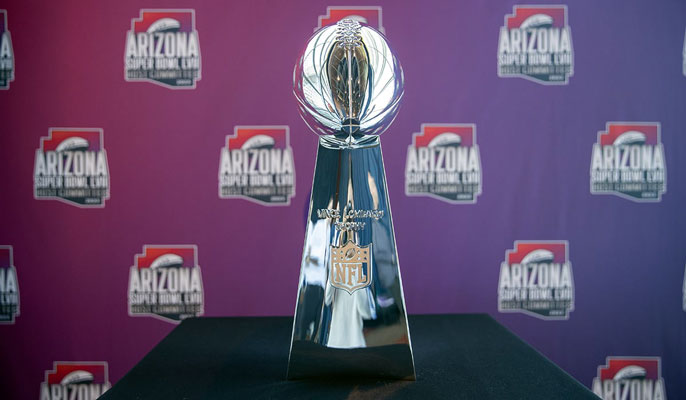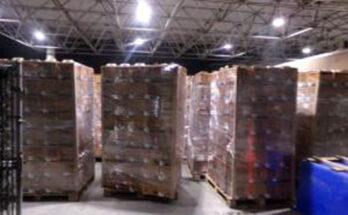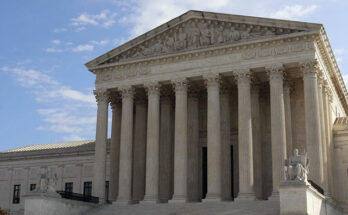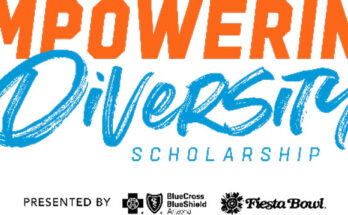Photo By Susan Wong/Cronkite News: Arizona is set to host its fourth Super Bowl on Feb. 12 at State Farm Stadium. The Valley will move into sole possession of fifth place on the list of U.S. metropolitan areas that have hosted the NFL’s crown jewel.
By Joe Eigo/Cronkite News
PHOENIX – If history means anything, the city of Glendale is in for a wild ride when the Super Bowl returns to Arizona in February.
This year’s Super Bowl will mark Arizona’s fourth time hosting the big game – and the three previous games in the Valley produced remarkable storylines and wild heroics after the NFL pulled the 1993 Super Bowl from Sun Devil Stadium when Arizona voters failed to make Martin Luther King Jr. Day a paid holiday. After a state-wide referendum passed in November 1992, the NFL awarded the state the 1996 Super Bowl.
Over a decade later, Maricopa County voters approved a hotel and car-rental tax to build a new, state-of-the-art retractable dome stadium for the Cardinals worth $334 million. The NFL soon awarded the 2008 Super Bowl and later the 2015 Super Bowl.
Now, the Valley is preparing for the upcoming Super Bowl – the 57th installment of the big game – which will place the Phoenix area in sole possession of fifth on the list of U.S. metropolitan areas that have hosted the most Super Bowls behind Miami, New Orleans, Los Angeles, and Tampa.
If the February game lives up to the previous Lombardi Trophy battles in Arizona, fans can expect something spectacular.
Super Bowl XXX: The Cowboys’ last stand
The Dallas Cowboys were an NFL dynasty when they arrived in Tempe for the 1996 Super Bowl against the Pittsburgh Steelers. The Cowboys won 27-17 at Sun Devil Stadium to capture their third championship in four seasons.
The victory was especially rewarding for Phoenix native Darren Woodson, a safety who was a cornerstone of the Cowboys franchise during that era.
Woodson starred at Maryvale High School and played college football at Arizona State, where he stood on the same Sun Devil Stadium turf before becoming the Cowboys’ second-round pick in the 1992 NFL draft.
“It was awesome man, because I grew up in Phoenix, went to school at Arizona State, and here I am playing in (the 1996 Super Bowl) at the school I went to and my home field basically, and honestly on a field that as a kid I used to dream of playing on,” Woodson said. “So that was special.”
The Cowboys had defeated the Buffalo Bills in the 1993 and 1994 Super Bowls, but major changes were in store after winning back-to-back titles.
A rift had formed between Cowboys coach Jimmy Johnson and team owner Jerry Jones, and former Oklahoma coach Barry Switzer took over the job before the 1994 NFL season.
The Cowboys suffered a heartbreaking loss to the San Francisco 49ers in the NFC championship game during Switzer’s first season. A controversial missed pass interference call on the 49ers’ Deion Sanders dashed the Cowboys’ title hopes.
Long before that play, Woodson foreshadowed the decline of “America’s Team.”
“I kind of started to see the fall of the Cowboys organization beginning midway through that ‘94 season,” Woodson said. “We just weren’t the same team. We didn’t have the same personality. We weren’t clicking on all cylinders, practices weren’t the same.
“Jimmy had a cadence and a system that we all believed in, and it was a change that not everybody accepted when Barry came in. We wanted it all the same, including myself.”
Woodson said the 1995 season was the most difficult, by far, despite the Cowboys winning the NFC championship to earn another Super Bowl berth.
“Of the three championships that I have, ‘92, ‘93, ‘95, the ‘95 team was by far the least talented,” Woodson said. “We had to overcome a ton of injuries that season.”
The injured players included Sanders, who the Cowboys had acquired in Week 2 of the ‘95 season. Sanders, who at the time played major league baseball and in the NFL, made his debut in Week 9 after undergoing arthroscopic ankle surgery for an injury he suffered while playing for the Cincinnati Reds.
The Cowboys wrapped up the regular season at Sun Devil Stadium, in a Christmas Day game against the Arizona Cardinals on “Monday Night Football.”
According to Woodson, the team found out on the plane Sunday that the Atlanta Falcons had beaten the 49ers, which meant a win on Christmas would give Dallas the No. 1 seed. But Woodson and the Cowboys knew the regular-season finale was no cakewalk, despite Arizona’s 4-11 record.
“Playing at Sun Devil Stadium against the Cardinals was never an easy task,” he said. “At the time they were an NFC East opponent. They were loaded with talent as well, and they knew the stakes were on the line for us.”
The Cowboys took care of business to win 37-13 and got an early preview of the 1996 Super Bowl venue.
In the playoffs, Dallas swiftly dismissed the Philadelphia Eagles and Green Bay Packers to book its return trip to Tempe, where the AFC Champion Steelers awaited another Super Bowl clash between the two storied franchises.
“We finally got there against the Pittsburgh Steelers in Arizona, had that game in hand in the first half, played well for three quarters, then in the fourth quarter we kind of fell apart and let them back in the game,” Woodson said.
In the end, Dallas walked away with a relatively comfortable victory, but Woodson wasn’t in the mood to celebrate in his old college stadium. The win didn’t carry the same feeling as the club’s previous Super Bowl victories.
“When we won the championships in 1992 and 1993, we celebrated in that locker room,” Woodson said. “Even afterward, we ran together, we went out and partied together after those wins, man. We were a really tight-knit team.
“We won that game in ‘95, and I can tell you, I sat on my stool in that locker room, and it wasn’t jubilation. It was just relief. And I’m telling you, moving forward from that point on, I just knew, this is going to be different, and it has been.
“It’s been different since we sat in that locker room in ‘95. That organization has not been the same. I just thought there were some underlying issues within the organization that needed to change, and it still hasn’t changed.”
Woodson didn’t stop there.
“I think it’s huge when a coach can totally control the outcome of personnel,” Woodson said. “If you’re going to shop and you’re going to put your team out (on the field), you need to be buying the groceries. Your coaching staff should be heavily involved with the draft. Jimmy Johnson bought all the groceries – fired guys, cut people; it didn’t matter. He ran football operations.”
Super Bowl XLII: The Helmet Catch
Riding the dynamic duo of Tom Brady and Randy Moss, the New England Patriots arrived in Glendale for the 2008 Super Bowl as the heavy favorites to join the 17-0 Miami Dolphins as the only unbeaten, un-tied team in NFL history as the first franchise to finish a season 19-0.
The New York Giants took the more challenging road to the Super Bowl. Coach Tom Coughlin’s team entered the playoffs as the No. 5 seed and pulled off improbable road victories against the Tampa Bay Buccaneers, the Dallas Cowboys, and the Green Bay Packers to secure a place in the Valley’s second Super Bowl.
The Patriots beat the Giants in Week 17 to complete their perfect regular season. The only surprise was how closely the game played out, with New England prevailing 38-35.
Giants wide receiver David Tyree remembers entering that game with uncertainty after New York’s Friday practice.
Tyree said it was the worst practice of his professional career. He dropped numerous passes from Eli Manning but remained positive on the verge of his biggest game ever.
“If I drop one ball, it’s going to suck,” he said. “If I drop eight, it’s a whole lot more, but it’s still a negative reflection when you’re pursuing perfection.
“I think that’s the mindset that it takes to achieve something significant, something valuable. So I left it there. I got a nice little pat on the back from Eli after practice, and I was ready to go to work.”
Tyree scored the Giants’ opening touchdown – which didn’t come until midway through the fourth quarter – for a 10-7 lead with more than 11 minutes to play.
“When I scored the touchdown, to me that was the climax,” Tyree said. “That was a go-ahead touchdown in the fourth quarter. (Our) defense is playing lights out, and I have every reason to believe this is the moment that’s going to seal the deal.
“It was rewarding, definitely a great sense of fulfillment in light of all the preparation till that moment.”
Tyree had every right to feel confident. The Giants’ defense had held New England without a score since the first play of the second quarter. However, the Patriots’ scoring drought ended on a Brady-to-Moss touchdown pass with 2:42 remaining to take a 14-10 lead.
The Giants needed a game-winning drive against perhaps the best team ever assembled and arguably the greatest quarterback in NFL history in the biggest American sporting event.
Tyree and the Giants were ready to rise to the occasion.
“Honestly, in the moment, it’s quiet,” Tyree said. “The idea of being a high performer is that everything slows down. So if the game is moving too fast, it means you’re thinking, and the more you think the slower you move.
“So when you can slow the game down, that means you’re thinking less and operating at a high frequency.”
After a quick first down and a fourth-down conversion, the Giants found themselves in a third-and-5 situation, two plays away from going home empty-handed.
“The play call was ‘76 max union Y sail,” Tyree said. “On my side is Steve Smith in the slot, myself on the outside. (That) tells me we had the sail combination, which is the post on the outside as a Cover 4 beater, which is basically two deep safeties by playing a quarter.
“On the other side, we got a two-beater, which New England played a lot on third down. So we had a perfect play call for the coverages they like to run, and if the offensive line would have blocked somebody, maybe I would have scored a post over the top. So thank God the line didn’t block anybody ’cause it set us up for a historical moment.”
What Tyree did next, many consider the greatest catch in Super Bowl history. It certainly ranks as the most unorthodox.
Immediately upon the snap, the offensive line broke down, allowing several Patriots pass rushers to close in on Manning, who escaped their grasps to find enough time and space to heave a prayer downfield for Tyree.
Tyree leaped with New England safety Rodney Harrison covering him and got both hands on the ball, pinned it against the crown of his helmet with his right hand as his left came off, then regripped it as Harrison tried to rip the ball loose.
Complete for 32 yards with 59 seconds to play.
It took Tyree time to fully understand the gravity of the play at the moment. After all, the game still had no winner.
“High fives on the sideline, but the game’s not won,” Tyree recalled. “It doesn’t even matter. You’re just so locked in because to have success and lose a game is one of the worst feelings. It’s incomplete. I’ve had that feeling in the past, and I was really locked into the reality of winning the game.
“So I honestly didn’t know anything other than the fact it was a good catch. I didn’t see a replay until I got back to the hotel. So I just knew it was a good catch and I’d had the greatest game of my life.”
The Giants scored four plays later on Manning’s 13-yard touchdown pass to Plaxico Burress with 39 seconds remaining to complete one of the biggest upsets in Super Bowl history by a score of 17-14.
Super Bowl XLIX: The Pick
The two weeks building up to the 2015 Super Bowl could only be described as a circus.
The Seattle Seahawks and New England Patriots, the NFC and AFC’s No. 1 seeds, each had their fair share of drama on the road to Glendale.
The defending champion Seahawks erased a 19-7 deficit against Green Bay in the final two minutes of the NFC Championship Game and won in overtime to earn a second consecutive shot at the Lombardi Trophy. Meanwhile, New England comfortably eliminated the Indianapolis Colts in a 45-7 beatdown of Andrew Luck’s team.
By Monday morning after championship weekend, the sporting world’s focus shifted to “Deflategate.”
The Patriots were accused of cheating in the AFC Championship on the belief that Brady had directed that 11 of 12 game balls the Patriots used to be deflated to a pressure below the NFL minimum, making the balls easier to grip, throw and catch.
The next two weeks grew into a public relations nightmare for the Patriots as they prepared for the Super Bowl against the Seahawks.
“The Tom Brady press conference where he was in a room full of reporters, many of them not sports reporters, but national reporters, it seemed to be endless,” said Bob Socci, the Patriots radio play-by-play voice during that season. “An interminable Q&A with Brady on the firing line, and the way that the story was reported nationally, it was kind of an ‘us against the world’ mentality from New England – not just for the players and the coaches, but I think for fans of the Patriots.”
Socci said he wasn’t sure what to expect when the team arrived in Arizona, but when the Patriots reached the Valley, it was clear the organization was on a mission to clear its name.
“That first 24 hours was just a continuation of the last week in New England,” Socci said. “(Owner) Robert Kraft went up on stage and immediately tried to set the tone. I think he tried to take the pressure off of his team and more or less … the Patriots declared their innocence.”
Socci, who had worked with the team for two seasons at the time of Deflategate, prepared to make his first Super Bowl call. Despite the magnitude of the event, and the increased media attention, he tried to approach it like every game.
“Nothing changes when you call a Super Bowl compared to other games,” Socci said. “It’s the nuts and bolts. You’re describing what you’re seeing and try to account for down and distance to keep the people informed.”
Socci admitted there is “one exception.” He knew his call would live in history.
“The implications are greater and the sound is going to be replayed,” he said. “I never want to screw it up, and I especially did not want to screw up on the Super Bowl stage. This is my first crack at the plate, at a big-time event like that and the calls are going to be remembered.”
Once the game kicked off, the noise surrounding the matchup subsided and the two best teams in the NFL put on a show.
The halftime score was tied at 14, then the Seahawks pulled ahead 24-14 late in the game. At the time, Brady and the Patriots needed to pull off the biggest comeback in Super Bowl history to win.
Socci recalls Patriots tight end Rob Gronkowski – a University of Arizona product – and receiver Julian Edelman having terrific games, and cited Edelman’s ability to hold onto a Brady pass over the middle after he was hit by Seahawks safety Kam Chancellor as “a big part of that comeback.”
“Eventually the Patriots get a touchdown by Danny Amendola,” Socci recalled. “Now, because of the touchdown, it’s a one-score game. Then they get the ball back and they go score again. In fact, it’s the same play pretty much that Brady missed Edelman on early in the first half. Now it’s a touchdown and the Patriots have gotten in front of the Seahawks.”
The biggest comeback in Super Bowl history would have been plenty to remember, but that wouldn’t have been enough to live up to an Arizona Super Bowl.
The Patriots and Seahawks weren’t done with the drama.
Seattle drove down the field and had the ball at the Patriots’ 1-yard line with a chance to regain the lead and leave Brady and the Pats with an 0-2 record in Glendale Super Bowls.
Seahawks running back Marshawn Lynch had rushed for 102 yards and a touchdown in the game, but rather than hand the ball off to Lynch, Seahawks quarterback Russell Wilson tried to thread the ball to receiver Ricardo Lockette at the goal line.
Patriots cornerback Malcolm Butler sealed the win, slicing in front of Lockette to intercept Wilson with 20 seconds left on the clock and New England held on, 28-24.
“It was intercepted, and so I’m screaming and calling the play,” Socci said. “And my partner Scott Zolak is going ballistic out of his chair. Then our producer, Mark, is in the middle of us. As I’m calling the play and trying to wrap it up, Mark has got me in a bear hug, (Zolak) is pounding his fist and his high five – you can hear the high five and the slapping of the hands in the background when you listen to the radio call.
“The biggest thing for me in that case, it was just the wonder of it all. Like confetti, picking up some confetti and sticking it in my pockets just to have it as a keepsake. Looking all around and taking it all in.”
To this day, the game is widely recognized as one of the wildest Super Bowl finishes in history – and a tough one to follow on Feb. 12.
But when it comes to Super Bowl Sundays, Arizona always finds a way to deliver.







